The right tools can make or break your online success. ClickFunnels vs WordPress are two major platforms that provide businesses, website owners, and entrepreneurs with the means to establish a robust online presence. However, the question remains: which platform best fits your unique needs? By dissecting the distinctive features, advantages, drawbacks, and practical applications of ClickFunnels and WordPress, we aim to shed light on this dilemma, enabling you to make an informed decision that aligns with your business objectives.
In this comprehensive comparison, we will not only delve into the individual characteristics of ClickFunnels and WordPress but also explore how they stack up against each other regarding marketing capabilities, eCommerce solutions, user experience, and more. We’ll also provide real-world examples of businesses that have leveraged these platforms to their advantage, offering a practical perspective on the potential of ClickFunnels and WordPress.
So, whether you’re a seasoned digital entrepreneur or a novice business owner venturing into the online realm, this in-depth comparison will guide you in selecting the platform that best caters to your needs and propels your online endeavors to new heights.
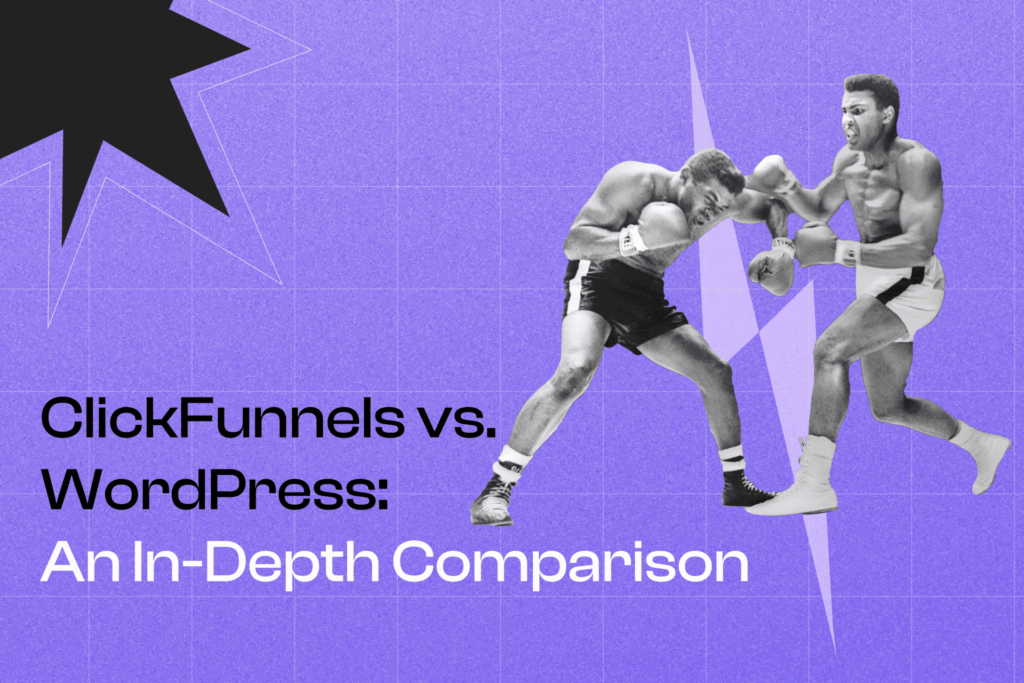
Table of Contents
- Understanding ClickFunnels and WordPress
- Overview of ClickFunnels
- Overview of WordPress
- Key Feature Comparison
- Pros and Cons: ClickFunnels vs. WordPress
- Making the Right Choice
- Frequently Asked Questions
Understanding ClickFunnels and WordPress
The crux of the matter lies in understanding the core focus of each platform. ClickFunnels is primarily a sales funnel builder, streamlining the buying process and increasing conversion rates. On the other hand, WordPress is renowned for being a free and versatile content management system with a strong WordPress community supporting it.
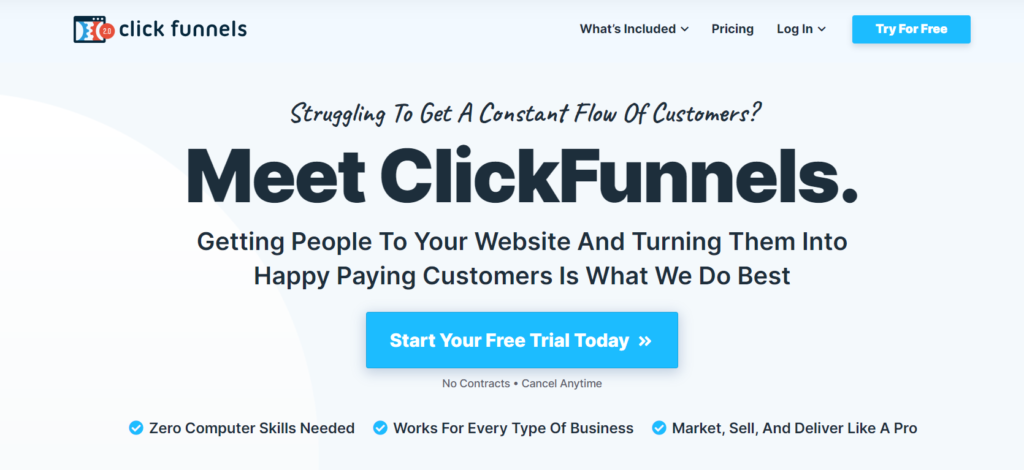
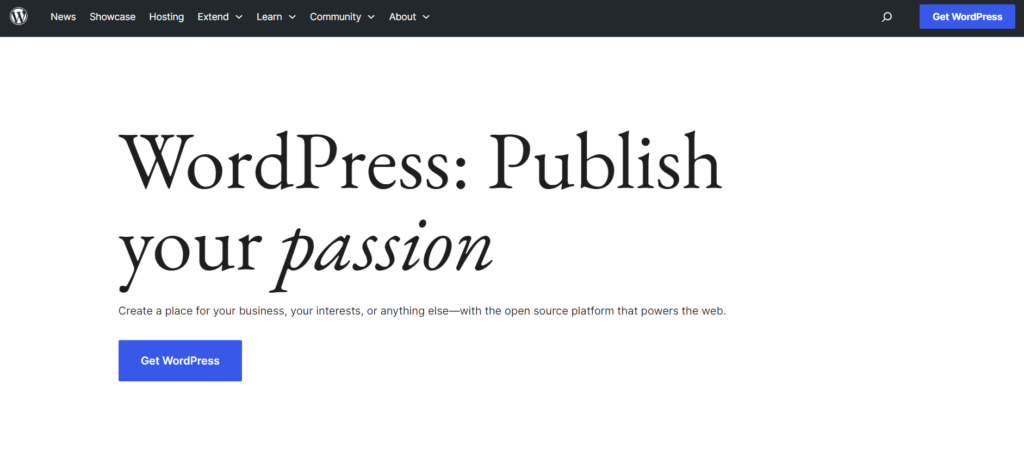
ClickFunnels operates as a Software-as-a-Service (SaaS) platform, so you don’t have full website ownership. In contrast, WordPress is a self-hosted CMS, granting you complete ownership over your WordPress website.
ClickFunnels and WordPress cater to different target audiences based on their specific needs and technical expertise. ClickFunnels is ideally suited for entrepreneurs, marketers, and businesses wanting to create high-converting sales funnels without extensive technical know-how. Its user-friendly interface and pre-built templates make it a go-to platform for those who aim to streamline their sales process and boost conversions.
Download ClickFunnels vs WordPress: An In-Depth Comparison now!
Don't have time to read everything or need a summary of the key points?
On the other hand, WordPress targets users who seek extensive customization and more control over their website. This includes bloggers, web developers, and businesses of all sizes. Its vast array of free themes and plugins makes it a popular choice for users who wish to build a unique and versatile website, even though it might require more technical expertise than ClickFunnels.
In essence, everything that ClickFunnels offers can be achieved with WordPress, often at a lower cost. However, ClickFunnels stands out for its user-friendliness and comprehensive tutorials that guide users through the process. On the other hand, while highly customizable and cost-effective, WordPress may require a professional developer’s assistance to fully unlock its potential and navigate its features.
Overview of ClickFunnels
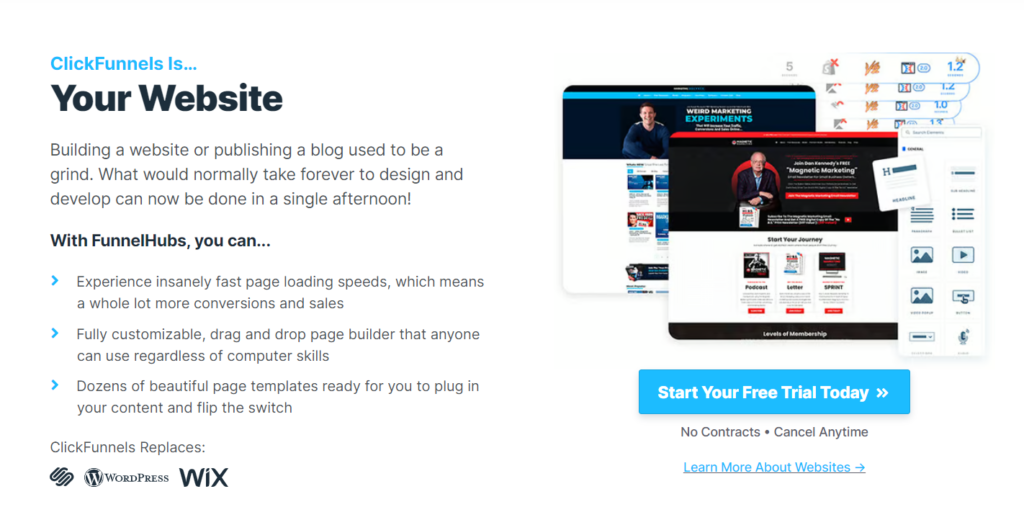
ClickFunnels is an all-encompassing solution designed to facilitate businesses in creating and launching sales funnels. Its key features and functionalities include:
- A user-friendly drag-and-drop editor that allows for easy assembly and customization of funnels.
- A wide selection of pre-designed templates for various types of funnels.
- Comprehensive email marketing tools that enable businesses to engage with their customers effectively.
- A built-in CRM system to manage and nurture customer relationships.
- Capabilities to create full-fledged websites.
- An integrated blogging platform to share valuable content and engage with the audience.
- A/B testing capabilities to assess different versions of a website, funnel, or email campaign for optimization.
- E-commerce capabilities to sell, ship, and fulfill physical product orders, all within the platform.
- The ability to sell courses, subscriptions, and digital products.
These features make it a popular choice for businesses looking for a secure, managed website and hosting provider that offers an alternative to WordPress sites.
Overview of WordPress

WordPress is a highly-regarded content management system (CMS) with a multitude of advanced features that include:
- The ability to construct and manage a wide array of web content, such as websites, mailing lists, forums, galleries, membership sites, learning management systems, and online stores.
- Inherent blogging capabilities.
- Access to almost 60,000 WordPress plugins, including advanced premium plugins.
- An opportunity to customize websites through an extensive range of themes and custom code.
One of the defining features of WordPress is its extensive library of themes and plugins. This vast selection allows users to add virtually any functionality to their website, tailoring it to their specific needs.
This ease of use makes it ideal for users who want to build a traditional website or blog without extensive technical knowledge.
ClickFunnels vs WordPress: Key Feature Comparison
User-Friendliness and Ease of Use
ClickFunnels is designed with the non-technical user in mind. It provides a straightforward interface that allows users to create sales funnels with a series of pre-built templates that can be customized through a simple drag-and-drop visual editor. This simplicity is perfect for entrepreneurs who want to quickly set up their sales funnels without diving into technical details.
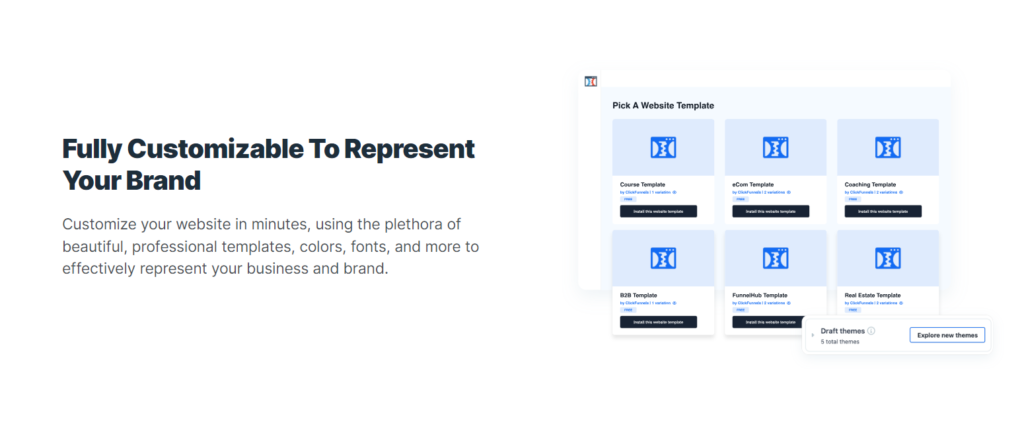
On the other hand, WordPress offers a more hands-on approach. While it does have a learning curve, the WordPress community has created numerous resources that help beginners get up to speed. The platform allows you to manage every aspect of your website, from content to layout. However, this control comes with complexity, and users often need to handle hosting, updates, and backups themselves.
Customization and Flexibility
ClickFunnels offers a range of customization options within its funnel templates. Users can adjust colors, fonts, and elements to match their branding. However, the platform’s customization is primarily within the confines of the sales funnel functionality.
WordPress, in contrast, is an open-source platform known for its vast customization capabilities. With thousands of themes and plugins, the possibilities are nearly endless. Users can tailor their sites to their exact specifications, making WordPress incredibly flexible for those willing to invest the time.
E-commerce Capabilities and Integrations
For e-commerce, ClickFunnels provides built-in shopping cart features and integrates with various payment gateways. It’s particularly powerful for creating streamlined sales processes that lead customers from initial interest to final purchase.
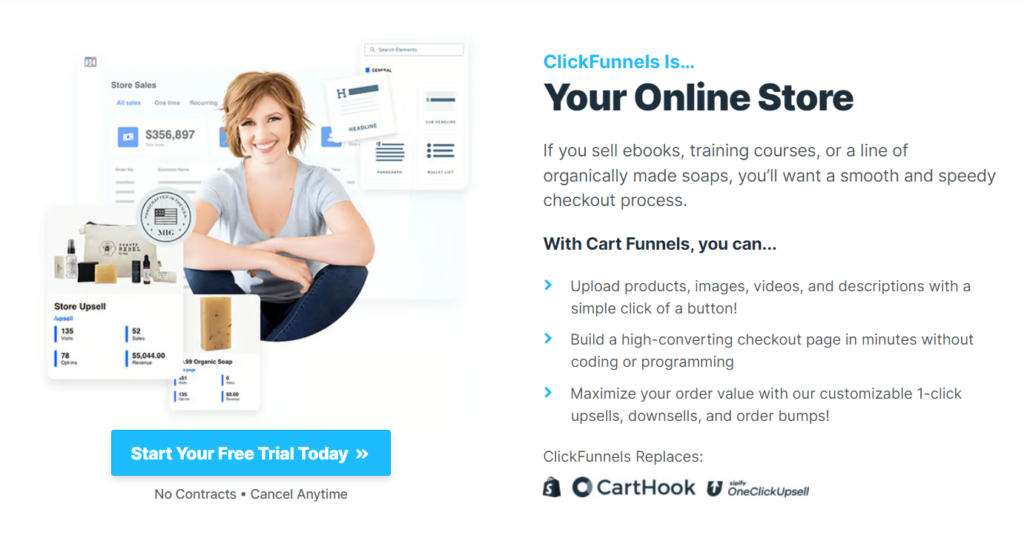
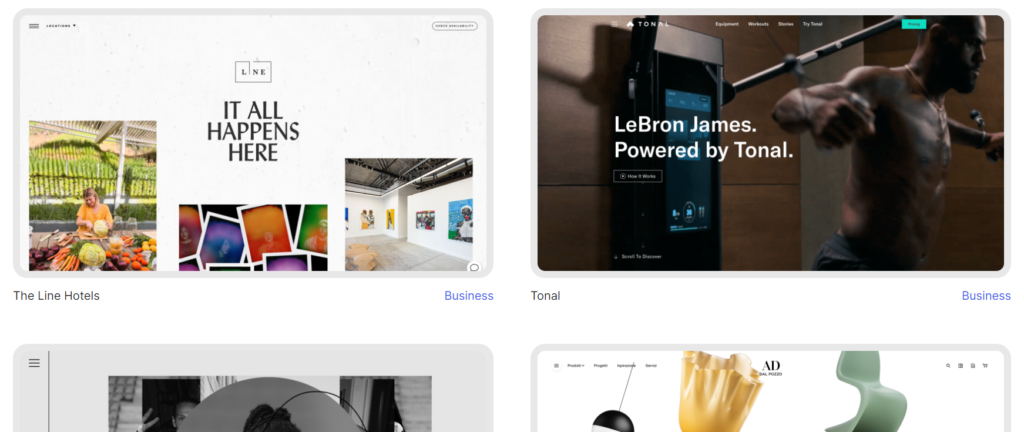
WordPress requires plugins like WooCommerce to add e-commerce functionality. While this may seem like an extra step, it offers extensive features and customization options for online stores. WordPress can support everything from digital downloads to large-scale retail operations.
Marketing Tools and SEO
ClickFunnels excels in marketing tools and data, particularly for funnel building and conversion rate optimization. It includes A/B testing, email integrations, and analytics focused on driving sales through funnels.
With plugins like Yoast SEO, WordPress offers comprehensive tools for search engine optimization (SEO), helping your site rank higher in search engine results. Additionally, its flexibility allows for a wide array of marketing strategies beyond just sales funnels.
Pricing and Scalability
ClickFunnels operates on a subscription model with different tiers based on features and the number of funnels/pages you need. It can become costly as your business grows and requires more complex funnels or increased traffic capacity. The prices start at $127/mo.
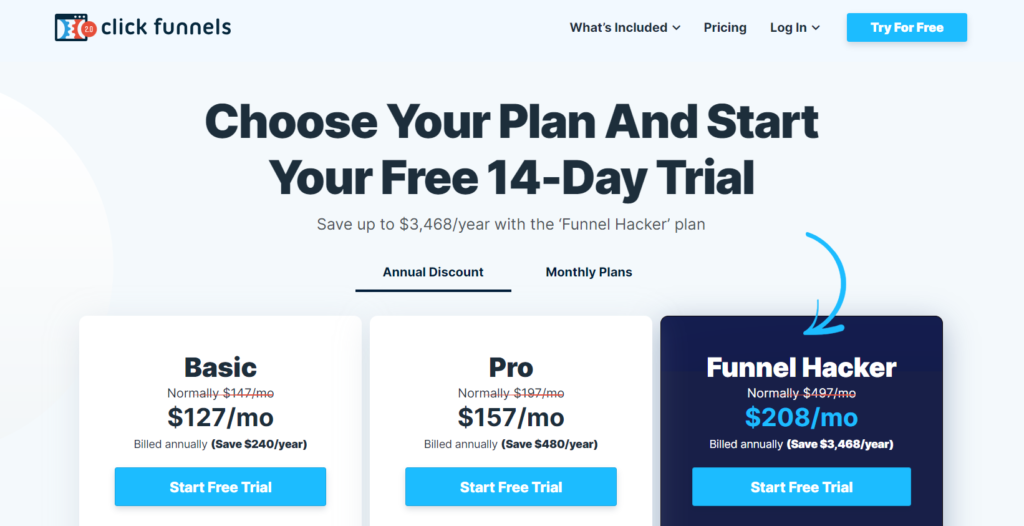
WordPress is free to use, but costs will accrue from hosting, domain registration, premium themes/plugins, and potential development work. Despite these costs, WordPress generally scales more economically due to the wide range of pricing options available for hosting and additional services.
Pros and Cons: ClickFunnels vs. WordPress
Choosing the right platform for your online business is a pivotal decision. ClickFunnels and WordPress are powerful tools, each offering unique advantages and drawbacks. To help you make an informed choice, let’s delve into the pros and cons of both platforms, presented in a comparative table.
ClickFunnels is a sales funnel builder designed to convert visitors into customers by guiding them through a series of steps. Here’s a look at its pros and cons:
Pros:
- All-in-One Solution: Integrates various marketing tools and features necessary to create a sales funnel.
- Ease of Use: User-friendly with drag-and-drop functionality, suitable for those without technical expertise.
- Conversion-Focused: Templates and tools are optimized for conversions, from landing pages to checkout.
- A/B Testing: Easy to implement split testing to optimize funnel performance.
Cons:
- Limited Customization: While it offers customization, it’s not as extensive as WordPress.
- Price: It can be expensive, especially for startups or small businesses.
- Less Control Over Hosting: Users are dependent on ClickFunnels’ hosting services.
WordPress is an open-source content management system (CMS) that powers a significant portion of the internet. Let’s examine its strengths and weaknesses.
Pros:
- Highly Customizable: With themes and plugins, customization possibilities are vast.
- Ownership and Control: Full control over your website and hosting choices.
- Community Support: A large community offering extensive resources, tutorials, and support.
- SEO Friendly: With the right plugins and practices, WordPress is excellent for SEO.
Cons:
- Learning Curve: It may take time to learn, especially for those new to CMS or web development.
- Maintenance: Requires regular updates and maintenance for themes, plugins, and core software.
- Security: Being self-hosted means you are responsible for your website’s security measures.
Making the Right Choice
Budget-wise, WordPress is generally more cost-effective, with plans starting from a free option. ClickFunnels, although more expensive, provides a wide range of tools and features that can justify the investment for some businesses.
Also, consider the level of technical expertise required for each platform. ClickFunnels is designed to be user-friendly and does not require prior technical skills. On the other hand, WordPress offers more customization and flexibility but requires a higher level of technical expertise.
ClickFunnels and WordPress have unique features, advantages, and limitations catering to different business needs and goals. ClickFunnels excels in providing an all-in-one solution for sales funnels, while WordPress is a powerful and versatile website builder with extensive customization options.
Ultimately, the choice between ClickFunnels and WordPress depends on your unique business needs and goals. Consider factors such as your specific objectives, budget, and technical requirements to make the right choice.
Frequently Asked Questions
Can you use ClickFunnels as your website?
Yes, you can use ClickFunnels as your website by dragging and dropping elements to create a professional website without coding. You can use an existing domain or purchase one through ClickFunnels.
What WordPress page builders are like ClickFunnels?
Elementor and SeedProd are WordPress page builders similar to the ClickFunnels experience. Elementor offers a visual, drag-and-drop editing environment, while SeedProd is the best landing page plugin in the market, letting users easily create landing pages, sales pages, product pages, and more.
Does WordPress have a funnel builder?
Yes, WordPress has many plugins that allow users to create, plan, and create their own sales funnels visually on a drag-and-drop canvas with complete control.
Can you really make money with ClickFunnels?
Yes, it requires hard work and effort, but it can be a great way to make money online. Especially with all of the learning tools, tutorials, and guidance, it can be easier to stay on track and focused with your sales funnels.
What is a WordPress used for?
WordPress is a content management system (CMS) that enables users to build websites, from personal blogs and online stores to community forums and advanced sites. Its architecture, powerful features, and customizability make it a popular choice for various use cases, powering approximately 40% of websites globally.